
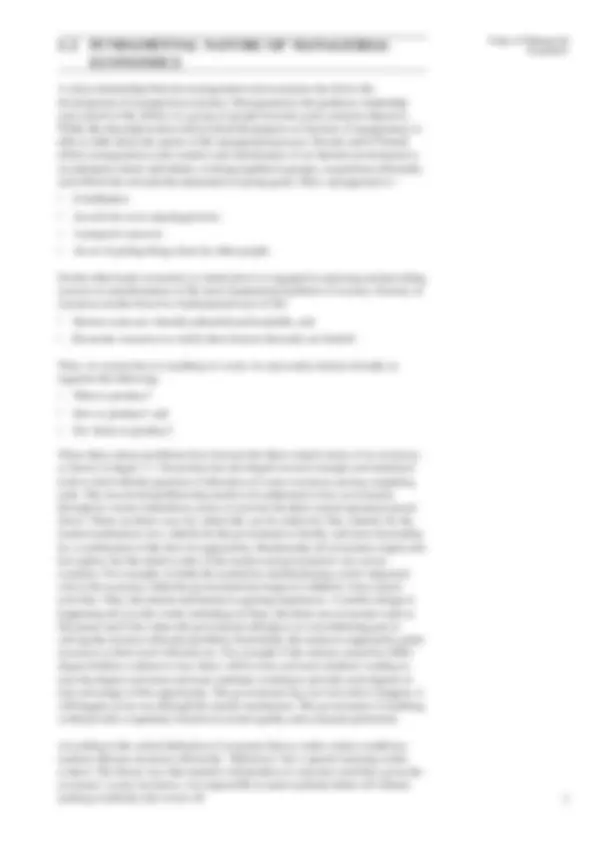
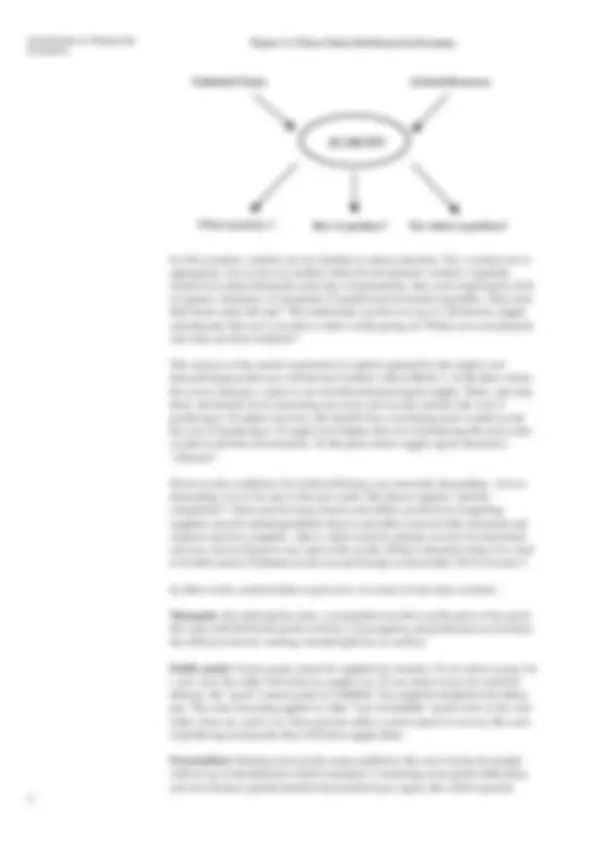
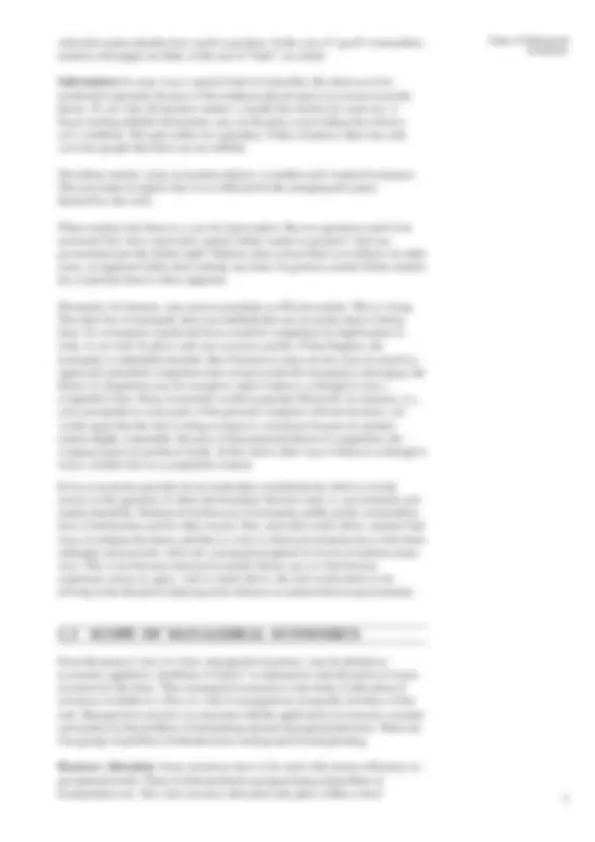
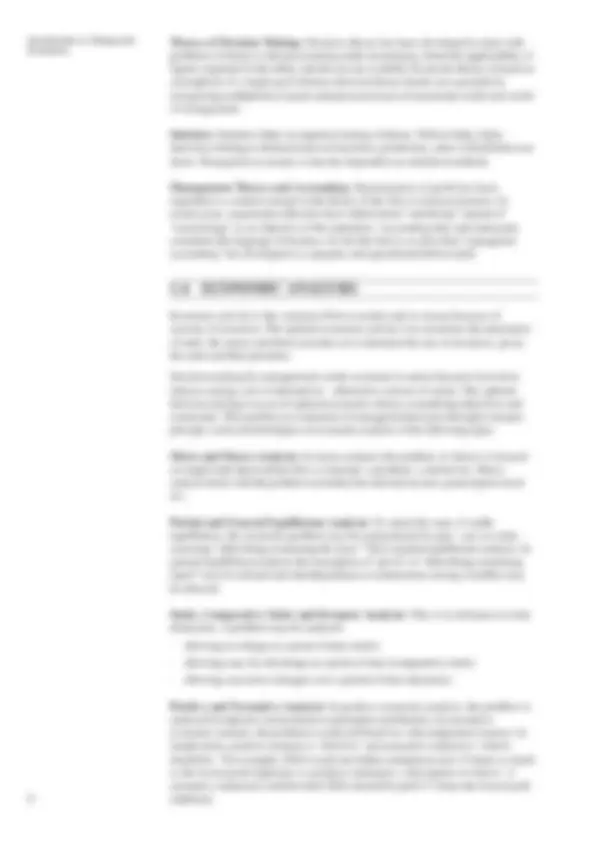
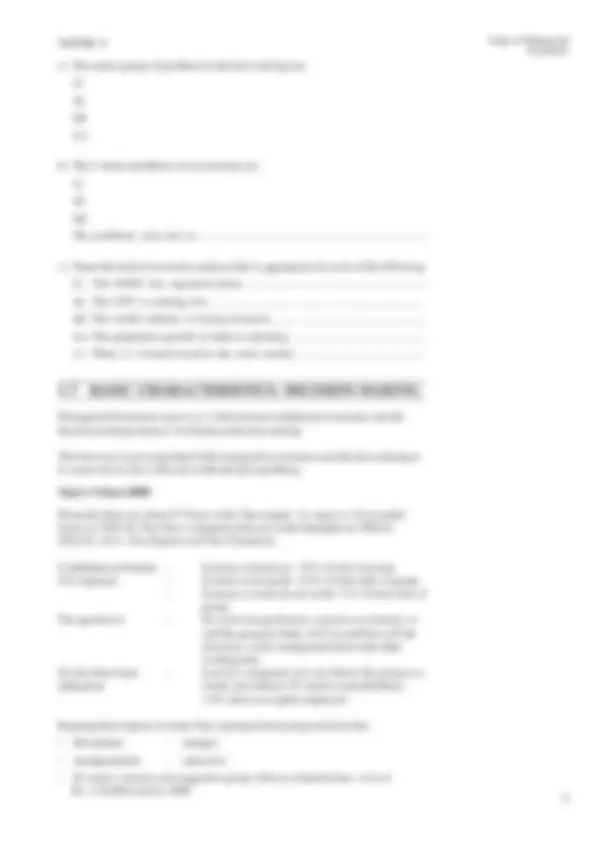
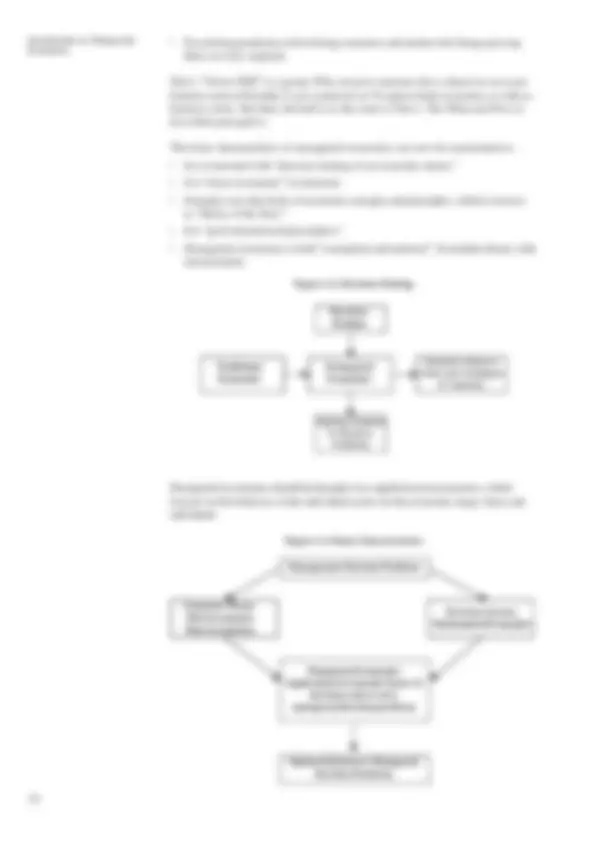


Study with the several resources on Docsity

Earn points by helping other students or get them with a premium plan


Prepare for your exams
Study with the several resources on Docsity

Earn points to download
Earn points by helping other students or get them with a premium plan
Community
Ask the community for help and clear up your study doubts
Discover the best universities in your country according to Docsity users
Free resources
Download our free guides on studying techniques, anxiety management strategies, and thesis advice from Docsity tutors
The format varies according to the course. The website which has been uploaded by the staff. The assignment can be downloaded either in Hindi or in English. Following are the instructions: assignments can be downloaded from the official
Typology: Schemes and Mind Maps
1 / 11

This page cannot be seen from the preview
Don't miss anything!







Introduction to
After studying this unit, you should be able to:
� (^) understand the nature and scope of managerial economics;
� (^) familiarize yourself with economic terminology;
� (^) develop some insight into economic issues;
� (^) acquire some information about economic institutions;
� (^) understand the concept of trade-offs or policy options facing society today.
1.1 Introduction
1.2 Fundamental Nature of Managerial Economics
1.3 Scope of Managerial Economics
1.4 Appropriate Definitions
1.5 Managerial Economics and other Disciplines
1.6 Economic Analysis
1.7 Basic Characteristics: Decision-Making
1.8 Summary
1.9 Self-Assessment Questions
1.10 Further Readings
For most purposes economics can be divided into two broad categories, microeconomics and macroeconomics. Macroeconomics as the name suggests is the study of the overall economy and its aggregates such as Gross National Product, Inflation, Unemployment, Exports, Imports, Taxation Policy etc. Macroeconomics addresses questions about changes in investment, government spending, employment, prices, exchange rate of the rupee and so on. Importantly, only aggregate levels of these variables are considered in the study of macroeconomics. But hidden in the aggregate data are changes in output of a number of individual firms, the consumption decision of consumers like you, and the changes in the prices of particular goods and services.
Although macroeconomic issues are important and occupy the time of media and command the attention of the newspapers, micro aspects of the economy are also important and often are of more direct application to the day to day problems facing a manager. Microeconomics deals with individual actors in the economy such as firms and individuals. Managerial economics can be thought of as applied microeconomics and its focus is on the interaction of firms and individuals in markets.
When you read a newspaper or switch on a television, you hear economic terminology used with increasing regularity. For a manager, some of these economic terms are of direct relevance and therefore it is essential to not only understand them but also apply them in relevant situations. For example, GDP growth rate could impact the product a manager is marketing, change in money
Introduction to Managerial Economics
supply by the RBI could impact inflation and affect the demand for your product, fiscal deficit could affect interest rates and therefore investment spending by a manager etc. The focus of managerial economics is on how the firm reacts to changes in the economic environment in which it operates and how it predicts these changes and devises the best possible strategies to achieve the objectives that underlie its existence.
The economy is the institutional structure through which individuals and firms in a society coordinate their desires. Economics is the study of how human beings in a society go about achieving their wants and desires. It is also defined as the study of allocation of scarce resources to satisfy individual wants or desires. The latter is perhaps the best way to broadly define the study of economics in general. The emphasis is on allocation of scarce resources across competing ends. You should recognize that human wants are unlimited and therefore choice is necessary. Choices necessarily involve trade-offs. For example, if you wish to acquire an MBA degree, you must take time off to devote to study. Your time has many uses and when you devote more time to study you are allocating it to a particular use in order to achieve your goal. Economics would be a most uninteresting subject if resources were unlimited and no trade offs were involved in decision making.
There are many general insights economists have gained into how the economy functions. Economic theory ties together economists’ terminology and knowledge about economic institutions. An economic institution is a physical or mental structure that significantly influences economic decisions. Corporations, governments, markets are all economic institutions. Similarly cultural norms are the standards people use when they determine whether a particular activity or behaviour is acceptable. For example, Hindus avoid meat and fish on Tuesdays. This has an economic dimension as it has a direct impact on the sale of these items on Tuesdays. Further, economic policy is the action usually taken by the government, to influence economic events. And finally, economic reasoning helps in thinking like an economist. Economists analyse questions and issues on the basis of trade-offs i.e. they compare the cost and the benefits of every issue and make decisions based on those costs and benefits.
The market is perhaps the single most important and complex institution in our economy. A market is not necessarily a physical location, but a description of any state that involves exchange. The exchange could be instantaneous or it could be over time i.e. exchange which is agreed today but where the transaction takes place, say after 3 months. You will learn in this course the myriad functions that markets perform, most significantly bringing buyers and sellers together. Markets could be competitive or monopolistic, with a large number of firms or a small number of firms, with free entry and exit or government licensing restricting entry of firms and so on. The major point is that firms operate in different types of markets and use the well-established principles of managerial economics to improve profitability. Managerial economics draws on economic analysis for such concepts as cost, demand, profit and competition. It attempts to bridge the gap between the purely analytical problems that intrigue many economic theorists and the day-to-day decisions that managers must face. It offers powerful tools and approaches for managerial policy-making. It will be relevant to present here several examples illustrating the problems that managerial economics can help to address. These also explain how managerial economics is an integral part of business. Demand, supply, cost, production, market, competition, price etc. are important concepts in real business decisions.
Introduction to Managerial Economics
Figure 1.1: Three Choice Problems of an Economy
Unlimited Choice Limited Resources
What do produce? How to produce? For whom to produce?
In rich countries, markets are too familiar to attract attention. Yet, a certain awe is appropriate. Let us take an incident where Soviet planners visited a vegetable market in London during the early days of perestroika, they were impressed to find no queues, shortages, or mountains of spoiled and unwanted vegetables. They took their hosts aside and said: “We understand, you have to say it’s all done by supply and demand. But can’t you tell us what’s really going on? Where are your planners and what are their methods?”
The essence of the market mechanism is indeed captured by the supply-and- demand diagram that you will become familiar with in Block 4. At the place where the curves intersect, a price is set such that demand equals supply. There, and only there, the benefit from consuming one more unit exactly matches the cost of producing it. If output were less, the benefit from consuming more would exceed the cost of producing it. If output were higher, the cost of producing the extra units would exceed the extra benefits. So the point where supply equals demand is “efficient”.
However, the conditions for market efficiency are extremely demanding—far too demanding ever to be met in the real world. The theory requires “perfect competition”: there must be many buyers and sellers; goods from competing suppliers must be indistinguishable; buyers and sellers must be fully informed; and markets must be complete—that is, there must be markets not just for bread here and now, but for bread in any state of the world. (What is the price today for a loaf to be delivered in Timbuktu on the second Tuesday in December 2014 if it rains?)
In other words, market failure is pervasive. It comes in four main varieties:
Monopoly: By reducing his sales, a monopolist can drive up the price of his good. His sales will fall but his profits will rise. Consumption and production are less than the efficient amount, causing a deadweight loss in welfare.
Public goods: Some goods cannot be supplied by markets. If you refuse to pay for a new coat, the seller will refuse to supply you. If you refuse to pay for national defence, the “good” cannot easily be withheld. You might be tempted to let others pay. The same reasoning applies to other “non-excludable” goods such as law and order, clean air, and so on. Since private sellers cannot expect to recover the costs of producing such goods, they will fail to supply them.
Externalities: Making some goods causes pollution: the cost is borne by people with no say in deciding how much to produce. Consuming some goods (education, anti-lock brakes) spreads benefits beyond the buyer; again, this will be ignored
What to produce?
when the market decides how much to produce. In the case of “good” externalities, markets will supply too little; in the case of “bads”, too much.
Information: In some ways a special kind of externality, this deserves to be mentioned separately because of the emphasis placed upon it in recent economic theory. To see why information matters, consider the market for used cars. A buyer, lacking reliable information, may see the price as providing clues about a car’s condition. This puts sellers in a quandary: if they cut prices, they may only convince people that their cars are rubbish.
The labour market, many economists believe, is another such ‘market for lemons’. This may help to explain why it is so difficult for the unemployed to price themselves into work.
When markets fail, there is a case for intervention. But two questions need to be answered first. How much does market failure matter in practice? And can governments put the failure right? Markets often correct their own failures. In other cases, an apparent failure does nobody any harm. In general, market failure matters less in practice than is often supposed.
Monopoly, for instance, may seem to preclude an efficient market. This is wrong. The mere fact of monopoly does not establish that any economic harm is being done. If a monopoly is protected from would-be competitors by high barriers to entry, it can raise its prices and earn excessive profits. If that happens, the monopoly is undeniably harmful. But if barriers to entry are low, lack of actual (as opposed to potential) competitors does not prove that the monopoly is damaging: the threat of competition may be enough to make it behave as though it were a competitive firm. Many economists would accept that Microsoft, for instance, is a near-monopolist in some parts of the personal-computer software business–yet would argue that the firm is doing no harm to consumers because its markets remain highly contestable. Because of that persistent threat of competition, the company prices its products keenly. In this and in other ways it behaves as though it were a smaller firm in a competitive market.
Even on economic grounds (never mind other considerations), there is no tidy answer to the question of where the boundary between state i.e. governments and market should lie. Markets do fail because of monopoly, public goods, externalities, lack of information and for other reasons. But, more than critics allow, markets find ways to mitigate the harm–and that is a task at which governments have often been strikingly unsuccessful. All in all, a strong presumption in favour of markets seems wise. This is not because classical economic theory says so, but because experience seems to agree. And as stated above, the real world seems to be moving in the direction of placing more reliance on markets than on governments.
1.3 SCOPE OF MANAGERIAL ECONOMICS
From the point of view of a firm, managerial economics, may be defined as economics applied to “problems of choice” or alternatives and allocation of scarce resources by the firms. Thus managerial economics is the study of allocation of resources available to a firm or a unit of management among the activities of that unit. Managerial economics is concerned with the application of economic concepts and analysis to the problem of formulating rational managerial decisions. There are four groups of problem in both decisions-making and forward planning.
Resource Allocation: Scare resources have to be used with utmost efficiency to get optimal results. These include production programming and problem of transportation etc. How does resource allocation take place within a firm?
Scope of Managerial Economics
Hailstones and Rothwel, “Managerial economics is the application of economic theory and analysis to practice of business firms and other institutions.” A common thread runs through all these descriptions of managerial economics which is using a framework of analysis to arrive at informed decisions to maximize the firm’s objectives, often in an environment of uncertainty. It is important to recognize that decisions taken while employing a framework of analysis are likely to be more successful than decisions that are knee jerk or gut feel decisions.
Activity 1
a) Development of managerial economics is the result of close interrelationship between management and economics. Discuss. ...................................................................................................................... ...................................................................................................................... ...................................................................................................................... ......................................................................................................................
b) Which statement is true of the basic economic problem?
(i) The problem will exist as long as resources are limited and desires are unlimited. (ii) The problem exists only in less developed countries. (iii) The problem will disappear as production expands. (iv) The advancement of technology will cause the problem to disappear.
c) Why is decision making by any management truly economic in nature?
...................................................................................................................... ...................................................................................................................... ...................................................................................................................... ......................................................................................................................
1.5 MANAGERIAL ECONOMICS AND OTHER
DISCIPLINES
Managerial economics is linked with various other fields of study like–
Microeconomic Theory: As stated in the introduction, the roots of managerial economics spring from micro-economic theory. Price theory, demand concepts and theories of market structure are few elements of micro economics used by managerial economists. It has an applied bias as it applies economic theories in order to solve real world problems of enterprises.
Macroeconomic Theory: This field has little relevance for managerial economics but at least one part of it is incorporated in managerial economics i.e. national income forecasting. The latter could be an important aid to business condition analysis, which in turn could be a valuable input for forecasting the demand for specific product groups.
Operations Research: This field is used in managerial economics to find out the best of all possibilities. Linear programming is a great aid in decision making in business and industry as it can help in solving problems like determination of facilities on machine scheduling, distribution of commodities and optimum product mix etc.
Scope of Managerial Economics
Introduction to Managerial Economics
Theory of Decision Making: Decision theory has been developed to deal with problems of choice or decision making under uncertainty, where the applicability of figures required for the utility calculus are not available. Economic theory is based on assumptions of a single goal whereas decision theory breaks new grounds by recognizing multiplicity of goals and persuasiveness of uncertainty in the real world of management.
Statistics: Statistics helps in empirical testing of theory. With its help, better decisions relating to demand and cost functions, production, sales or distribution are taken. Managerial economics is heavily dependent on statistical methods.
Management Theory and Accounting: Maximisation of profit has been regarded as a central concept in the theory of the firm in microeconomics. In recent years, organisation theorists have talked about “satisficing” instead of “maximising” as an objective of the enterprise. Accounting data and statements constitute the language of business. In fact the link is so close that “managerial accounting” has developed as a separate and specialized field in itself.
1.6 ECONOMIC ANALYSIS
Economic activity is the constant effort to match ends to means because of scarcity of resources. The optimal economic activity is to maximise the attainment of ends, the means and their scarcities or to minimise the use of resources, given the ends and their priorities.
Decision making by management is truly economic in nature because it involves choices among a set of alternatives - alternative courses of action. The optimal decision making is an act of optimal economic choice, considering objectives and constraints. This justifies an evaluation of managerial decisions through concepts, precepts, tools and techniques of economic analysis of the following types:
Micro and Macro Analysis: In micro-analysis the problem of choice is focused on single individual entities like a consumer, a producer, a market etc. Macro analysis deals with the problem in totality like national income, general price level etc.
Partial and General Equilibrium Analysis: To attain the state of stable equilibrium, the economic problem may be analysed part by part - one at a time - assuming “other things remaining the same.” This is partial equilibrium analysis. In general equilibrium analysis the assumption of “given” or “other things remaining equal” may be relaxed and interdependence or interactions among variables may be allowed.
Static, Comparative Static and Dynamic Analysis: This is in reference to time dimension. A problem may be analysed
Positive and Normative Analysis: In positive economic analysis, the problem is analyzed in objective terms based on principles and theories. In normative economic analysis, the problem is analyzed based on value judgement (norms). In simple terms, positive analysis is ‘what it is’ and normative analysis is ‘what it should be.’ For example, CEOs in private Indian enterprises earn 15 times as much as the lowest paid employee is a positive statement, a description of what is. A normative statement would be that CEOs should be paid 4-5 times the lowest paid employee.
Introduction to Managerial Economics
� (^) From being production-led to being consumer and market-led; being up in top three in every segment.
Tata’s “Vision 2000” is a group. Why not give someone else a chance to run your business more efficiently if you cannot do so? It makes better economic as well as business sense. But then, the ball is in the court of Tata’s. The What and How to do is their prerogative.
The basic characteristics of managerial economics can now be enumerated as: � (^) It is concerned with “decision making of an economic nature.” � (^) It is “micro-economic” in character. � (^) It largely uses that body of economic concepts and principles, which is known as “theory of the firm.” � (^) It is “goal oriented and prescriptive” � (^) Managerial economics is both “conceptual and metrical”. It includes theory with measurement.
Figure 1.2: Decision-Making
Managerial economics should be thought of as applied microeconomics, which focuses on the behavior of the individual actors on the economic stage; firms and individuals.
Figure 1.3: Basic Characteristics
Management Decision Problems
Economic Theory Microeconomics Macroeconomics
Decision Science Mathematical Economics
Managerial Economics Application of economic theory & decision tools to solve managerial decision problems
Optimal Solution to Managerial Decision Problems
Decision- Problem
Traditional Economics
Managerial Economics
Decision Sciences (Tools and Techniques of Analysis)
Optimal Solution to Business Problems
1.8 SUMMARY
Managerial economics is used by firms to improve their profitability. It is the economics applied to problems of choices and allocation of scarce resources by the firms. It refers to the application of economic theory and the tools of analysis of decision science to examine how an organisation can achieve its objective most efficiently. Managerial decisions are evaluated through concepts, tools and techniques of economic analysis of various types. It is linked with various fields of study.
1.9 SELF-ASSESSMENT QUESTIONS
1.10 FURTHER READINGS
Haynes, W.W., Managerial Economics: Analysis and Cases, Business Publications, Inc., Texas, Ch. 1.
Adhikary, M., Managerial Economics, Khosla Publishers: Delhi, Ch. 1.
Baumol, William, J., Economic Theory and Operations Analysis, Prentice-Hall of India Pvt. Ltd., New Delhi.
Scope of Managerial Economics